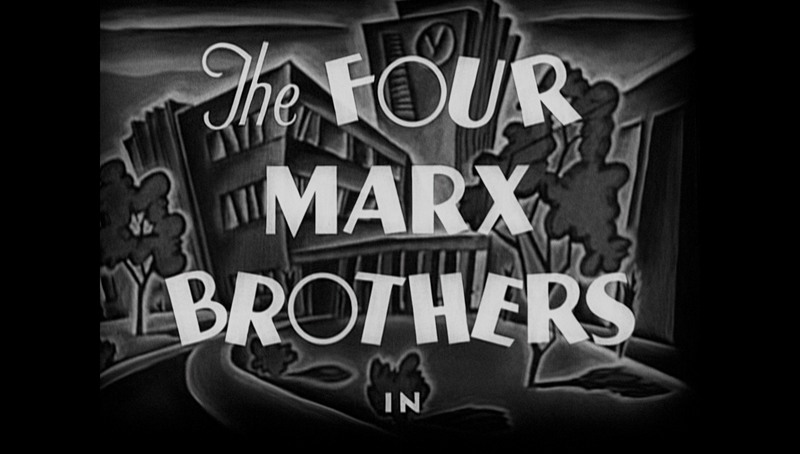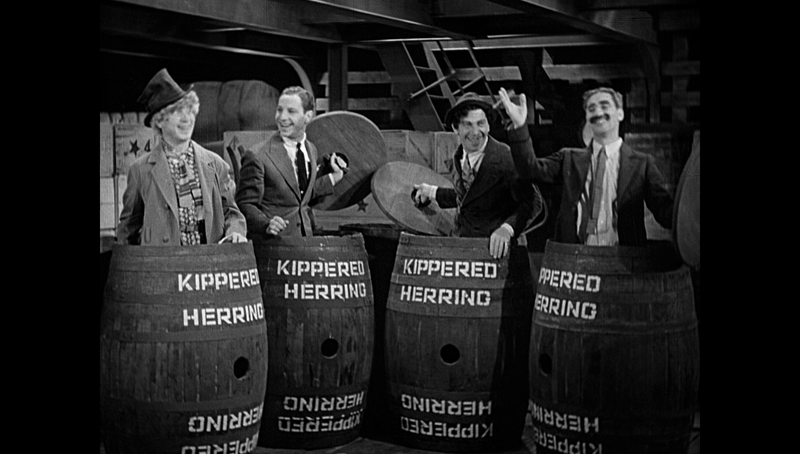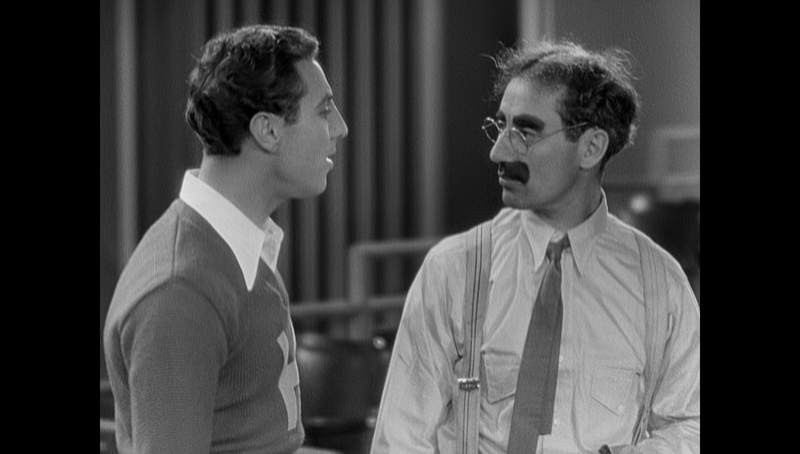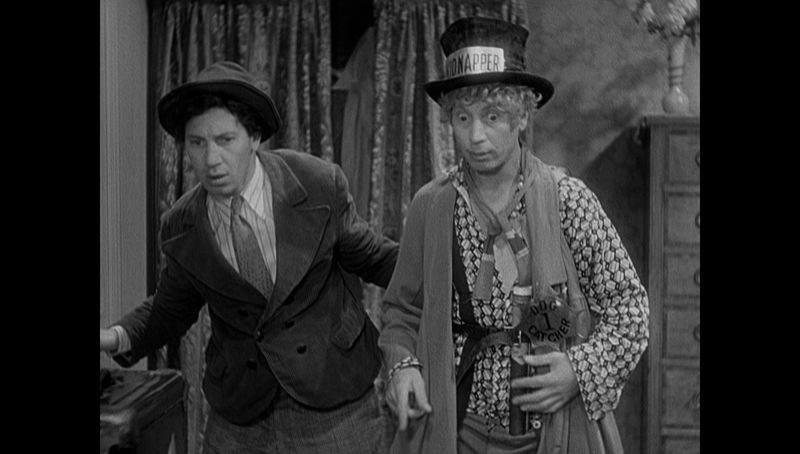The Marx Brothers Silver Screen Collection Blu Ray Review
Marx Brothers Argent Screen Drove - Restored Edition, The
List Toll: $59.98 [Buy now and save at Amazon]
In x Words or Less The Story Then Far... The Movies Groucho is inarguably the group's leader, and he often plays a character in a position of ability of some sort. A fast talker, he is quick with a quip, insult or comeback, verbally pummeling whoever shares a scene with him to the point where it becomes a monologue at times considering no i can go a word in edgewise, Even if a particularly pun doesn't land right, he fires then many that he's bound to draw a express joy soon afterward. And while wordplay is his weapon of choice, he'due south but every bit adept at physical comedy, with his exaggerated eyebrows and moustache (aided by heavy blackface) helping to sell the gag. A sarcastic amanuensis of chaos, his aristocratic, detached behavior makes him capable of engaging with and commenting on whatever class of person and whatever situation, lending him a universality that serves him well every bit the films motion from socialite parties to political parties. A talented piano histrion, Chico may be the merely one who can keep up with Groucho verbally, only he does so only because his simple, confused, stereotypically-absolute replies stymie and frustrate his brother and keep their conversations at a manageable pace. Usually playing a schemer of some sort, Chico blends a downward-to-earth reality with a ridiculous ignorance that allows for nonsensical puns to grow, similar the famous "Why a duck?" routine. He's ofttimes paired with the curly-haired Harpo, the silent partner in the grouping, who communicates mainly through whistles and past honking a horn. A homo cartoon with the facial elasticity of Martin Short, Harpo is not bound by reality, as he is capable of pulling annihilation from the pockets of his coat (be it a hot loving cup of java or a candle burning at both ends) and has a disturbing habit of chasing women--literally chasing them. Together, Chico and Harpo are a fantastic comedy pair, reaching perfection in Duck Soup, in a routine involving hats and a put-upon lemonade salesman that's brilliantly synthetic. In that location's besides Zeppo, the fourth Marx blood brother, who bowed out afterwards these films, moving on to his business interests. The least memorable of the group, with no gimmicks or stand-out characters, he usually plays the straight-man in the films. His performances were not indicative of a lack of talent though, as he was quite entertaining when given something to practise, as seen in Monkey Business, where he mixed one-act and his ability to play a romantic lead to good effect. He simply rarely got the chance to practice so, often playing a subordinate role to Groucho, be it his banana (Animal Crackers) or son (Horse Feathers). Oddly, a more important Marx blood brother than Zeppo was probable not a Marx, nor a brother, every bit Margaret Dumont was a key to several of these films, playing a woman of high society--the perfect foil for Groucho and company. Without her pomposity to deflate, the Marxes would be directionless whirlwinds, a point made clear in the 2 films here she didn't star in, Monkey Business and Horse Feathers, where Thelma Todd takes her spot, playing very different parts and bringing the moving picture a very unlike energy. Brute Crackers, like The Cocoanuts, was adjusted from the stage, and features perhaps the best known musical number of the Marxes' career, the film-opening "Hooray for Captain Spaulding", which introduces Groucho's conquering hero, returning from Africa to be feted at a party thrown past Mrs. Rittenhouse (Dumont). There are a swell deal of similarities between Creature Crackers and The Cocoanuts, including some other serial of schemes and another young couple in love, this time involving a valuable painting. Though the films are comparable, this motion-picture show shows how the Marxes learned from their first endeavor in forepart of the camera and how they improved their act, getting sharper with the wordplay, while cutting back a bit on the musical elements (even if Chico and Harpo still get their instrumental spotlights.) Nosotros as well get to run across the emergence of Harpo's magic pockets, which are utilizes for a great wordplay gag of their own. Unfortunately, the story is withal less important than the jokes, equally all the plot is wrapped upwardly in a rapid, sharp ending (another hallmark of the Marx brothers' films. Monkey Business organization, the first Marx brothers film written specifically for the screen, is the to the lowest degree story-focused, with an assortment of random segments built effectually the idea that the brothers, as stowaways aboard a ship, get involved in a rivalry between two gangsters, thanks to Groucho's interest in the 1 gangster's wife, and Zeppo'south interest in the other's daughter. Marked mainly past the opening hunt around the gunkhole, involving all 4 brothers, a Punch & Judy scene with Harpo and some fine Groucho and Chico conversation, it's a chip as well all over the identify, even for the Marx brothers. Perhaps that's why Zeppo was able to take such a primal role. Equus caballus Feathers is arguably the best of the films in this set, in close competition with the more than critically-appreciated Duck Soup, featuring several outstanding examples of the Marx blood brother's genius, including the fantastic football game at the end of the movie. Groucho is named the president of Huxley College (how he manages to keep getting positions of say-so is easily the biggest mystery of the Marx university) and he quickly goes to work improving the school, on the advice of his pupil son (Zeppo). Step one: improve the football team, which he fails to do when he misses out on hiring two ringers, and instead accidentally brings in Chico and Harpo, leading to campus chaos. Zippo shows the film's age ameliorate than the core concept of the brothers all lusting for the "campus widow" (Todd) an older woman who beds students (which obviously was a thing.) The best of the Marxes is on display though, including a slap-up door entry sequence, some classic Harpo madness (like his wonderful "cut the cards" gag), a fun opening song and dance by Groucho, and that game, total of ridiculous play a trick on plays. At but 78 minutes, it flies by, despite still featuring a Chico piano and a Harpo harp scene, but there are some problematic moments of misogyny nowadays, which are rather aggressive in viewing the film today. Duck Soup is ane of well-nigh viewers' favorite Marx brothers' films, and that'southward for good reason. Groucho plays the new leader of the bankrupt country of Freedonia, installed by the country's main benefactor, Mrs. Teasdale (Dumont). While he goes about his wacky business organization (which consists mainly of conversations with Teasdale), Chico and Harpo are decorated spying on Groucho on behalf of some revolutionaries seeking to take over the country. There are some amazing gems to behold in this moving-picture show, including what may exist the greatest sequence in the grouping'south careers, every bit Chico and Harpo annoy a lemonade salesman past messing with his hat. The sense of energy and spontaneity in this intricately performed bit are just outstanding. Personally, the ending, which involves Freedonia going to war with the country of Sylvania, is overdone and somewhat repetitive, which brings it down a notch, but in that location's a lot to like in the Marx brothers' final Paramount film. These films represent newly restored versions, which return the cuts fabricated when the films were reissued in the 1930s, with edits required past censors. What this ways is that some of the more suggestive cloth that had been excised previously is at present dorsum, similar returning Animal Crackers to its appropriate length. Some fabric which was thought lost to censors was really just lost to age and mistreatment of the original films, but these are the films in as shut to original shape as is likely possible. The Discs The Quality The films are presented with 2.0 DTS-Hd Master Audio duped mono tracks, simply unfortunately they can only do so much with audio from the early days of talking pictures (where stationary microphones meant some dialogue simply wasn't captured clearly. Equally a consequence, much of the time I watched these films, I did and then with subtitles on, to brand sure I didn't miss anything (and, interestingly, the subtitles didn't exactly match what the characters said at times.) Singing with music (particularly by choruses) tin can be difficult to make out, and even some of the instrumentals (Harpo'due south harp in Horse Feathers in particular) sound very harsh and muddled. There take been some victories over the past, every bit traditional concerns like hiss and crackling take been cleaned out. For authenticity's sake, they sound similar movies of their era. The Extras Here'due south the track breakdown: Held on the third disc with Duck Soup is the new 79:57 documentary The Marx Brothers: Hollywood's Kings of Chaos, which highlights the group's Paramount films and their careers in whole, via interviews with a number of participants, including David Mandel, Dick Cavett, screenwriters Larry Karaszewski and Scott Alexander, flick professor Dr. Drew Casper, Groucho biographer Steve Stoliar and Groucho'due south grandson Andy Marx (in addition to the commentators on the films). Though it does travel downwardly much of the aforementioned paths as the commentaries, it takes a clear, more than narrative path through the Marxes' lives and careers, and the combination of the various perspectives (from expert to family to fan) makes for a cohesive movie of the men and their piece of work. The only carry-over from the DVD Silvery Screen Drove is the only on-disc extra that set held: "Inside the NBC Vault - The Today Show Interviews". Running sixteen:45 combined (they can be watched together or individually), these three clips come up from interviews in the '60s and '80s, as Harpo (1961), Groucho (1963) and Bill Marx (1985) spend a little time chatting. Harpo maintains his silence shtick, and also chases a female anchor effectually (an uncomfortable sight from the 21st century), while Groucho chats about Marilyn Monroe and the casting procedure, treating a female person ballast in a way that would get him suspended from the show today. Bill Marx, promoting his volume well-nigh his male parent, talks with Gene Shalit about his family unit, equally shares some home movies, which show Harpo and Groucho in their downtime. Also in the packet is an attractive 12-page booklet (printed on heavy, glossy paper), titled "The Marx Brothers: From Vaudeville to Hollywood". The booklet is adapted from Bader'due south book, Iv of the 3 Musketeers: The Marx Brothers on Stage, tracing the grouping'south relationship with vaudeville from their early days through their Hollywood stardom. As a primer for anyone new to the brothers, information technology'south a quick and informative read. The Bottom Line Follow him on Twitter *The Reviewer's Bias section is an attempt to assist readers utilize the review to its all-time effect. Past knowing where the reviewer's biases lie on the film's subject affair, one tin read the review with the right mindset.
The first v films from the archetype four brothers 
Loves: Smart one-act
Likes: Quondam-school comedy, The Marx Brothers
Dislikes: Needing subtitles, erstwhile-school musical songs
Hates: Misogyny
The Marx brothers, four existent brothers who were hits on the vaudeville excursion, brought their mix of quick wit and concrete gags to the big screen at the dawn of the talking motion movie, and wound up becoming some of the biggest stars in film comedy history by making some of the most beloved films ever. Though their combined cinematic output was somewhat brief, it was remarkably stiff. Their films have received a number of releases over the years, including DVD box sets in 2004 and 2010, and DVDTalk has reviews of those releases.
The Marx brothers may not accept the cultural relevancy today that they had a few decades ago, just their influence continues to be felt, as their catchphrases and gags (and even their physical caricatures) reverberate through the creative people they've influenced through their films. That includes their first v films, The Cocoanuts, Animal Crackers, Monkey Concern, Horse Feathers: and Duck Soup, some of which are considered among the greatest film comedies ever made, powered by the brothers' distinct on-screen personas and unique talents. 

The v Paramount films that make up "The Marx Brothers Silvery Screen Collection - Restored Edition" are spread over three Blu-ray discs, with The Cocoanuts and Animal Crackers on the first disc, Monkey Business and Horse Feathers on the 2d, and Duck Soup on the third. The discs are held in a three-panel spot-UV coated digipak (featuring beautiful fine art on the within), with discs two and 3 overlapped, while the offset panel has a pocket for inserts. The digipak is held in a lightweight slipcase, which is embossed and spot-UV coated. Annoyingly, the only menu yous find when popping in a disc is the film selection screen. Beyond that, y'all must utilize your pop-up card button to access the options to spotter the film, select scenes, check out the special features and adjust the ready-upwardly. There are no audio options, while English language SDH and French subtitles are available.
Allow's be realistic for a moment. These films haven't received the most loving treatment over the years, and equally a consequence, what we are left with are not exactly the nearly pristine materials ever. In fact, some material simply simply doesn't exist anymore (one look at Horse Feathers and the scene with the brothers in Miss Bailey'southward room volition show this, as there are several jump cuts thanks to frames having long since been destroyed.) In The Cocoanuts, there's heavy noise in some parts and the auction scene is a blown-out mess, compared to the remainder of the pic, as it comes from a separate print--a move required to simply maintain its presence in the film. Meanwhile, the canoe scene in Horse Feathers is so jittery it looks similar it was shot during an convulsion. All that said, overall, these 1080p, 1.33:1 transfers (naturally cavalcade-boxed) look very nice, with a minimal corporeality of dirt and harm--clean to the point where nothing stands out as obvious--and an impressive amount of fine detail (which, unfortunately, shows how some of the visual gags were pulled off, and which makes the greasepaint on Groucho more pronounced). Black levels are solid, and contrast is good,making for a pleasing viewing feel. There are some points where things go a bit soft, but whether that's from the source or smoothing ( Universal does have a reputation in such matters) is up for argue.
Each picture is accompanied by a newly-recorded commentary by a flick expert (or more than i in some cases), making the set a course in the Marx brothers. Because there's nearly no crossover in participants between the 5 tracks, in that location is some repetition, equally each person uses their time as an opportunity to share pretty much everything they know nigh the team'south work. Heavy on trivia about the Marxes and the product of the films, they also touch on early film camera technique, the bandage of the films, studio politics and business organisation and, most helpful of all, they provide context for the films in connectedness to the time of their release, explaining cultural references that no longer resonate and pointing out where the films' pre-Code status allowed them to get away with fabric they would later be censored for. All of the commentators do a fine job, merely critic F.X. Feeney and the tag team of Leonard Maltin and Marx Brothers historian Robert S. Bader are personal favorites.

Legends of film one-act, the Marx brothers were innovative comedians and large personalities, just their early films tended to be somewhat formulaic showcases for their immense talents, and from a more aware perspective, they can exist uncomfortable to watch at times. That said, combined, their first five films are a highlight reel of truly classic comedy bits. This collection, which offers high-definition transfers of the films in newly-restored versions, probable looks and sounds every bit skilful as these movies ever volition (for several reasons) and offers a nice spread of extras that should appeal to fans of the brothers' Paramount work. Considering the price, information technology's worth picking up for fans and newcomers akin.
Francis Rizzo III is a native Long Islander, where he works in academia. In his spare time, he enjoys watching hockey, writing and spending time with his married woman, daughter and puppy.
molinaheratat1982.blogspot.com
Source: https://www.dvdtalk.com/reviews/71389/marx-brothers-silver-screen-collection-restored-edition-the/
0 Response to "The Marx Brothers Silver Screen Collection Blu Ray Review"
Post a Comment